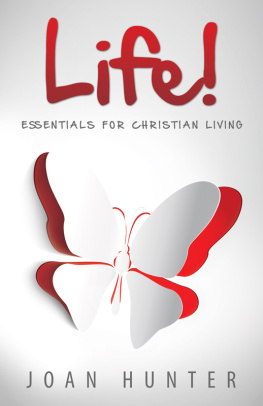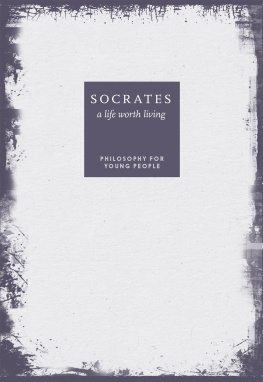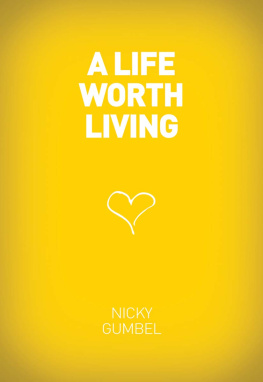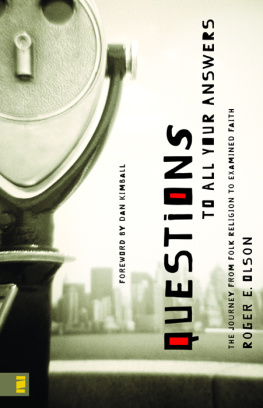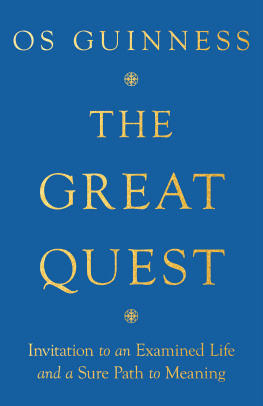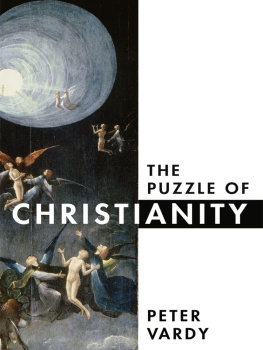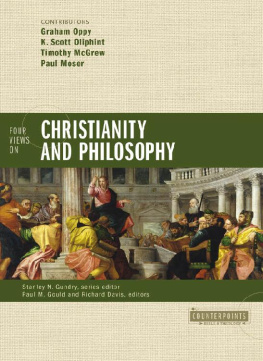Copyright 2021 Neil H. Williams. All rights reserved. Except for brief quotations in critical publications or reviews, no part of this book may be reproduced in any manner without prior written permission from the publisher. Write: Permissions, Wipf and Stock Publishers, W. th Ave., Suite , Eugene, OR 97401 .
W. th Ave., Suite
Unless otherwise indicated, Scripture quotations are from New Revised Standard Version Bible, copyright 1989 National Council of the Churches of Christ in the United States of America. Used by permission. All rights reserved worldwide.
Introduction
W hen Socrates said, an unexamined life is not worth living, he set before us a quest that requires some questioning, investigation, and reflection. What is a worthwhile life? Who gets to decide what it is? And why make an examined life central to this quest?
For many philosophers, the life worth living is a particular kind of lifea good life. This good life isnt a life that pursues all the goods and goodies, but is a right kind of lifea reasonable and flourishing life, a virtuous and just life, an honest and wise life. It is a skeptical life that questions everything, including inquiring of ourselves and our actions.
What does it mean to live a good life when we face climate catastrophe, loss of biodiversity, illegal trade, habitat loss, poaching, pollutants, depleted rainforests and coral reefs, and some scientists thinking that we are on the verge of a mass extinction event?
What does it mean to live the good life when the rich gain more and the poor struggle to survive, when the actions of a few deprive many from a fulfilled life?
What does it mean to live a good life, now that in this stage of our evolutionary history, human societies comprise more than just small primitive clans?
What does it mean to live the good life when our world today still struggles with religion-inspired ignorance, violence, and fanaticism? When individuals and groups still promote xenophobia, misogyny, and racism?
What does it mean to live a good life when governments trample human rights, violate their citizens privacy, and engage in torture, extrajudicial killings, and aggressive wars?
Its a tall order to find satisfactory answers to such questions. Even if we figure out some answers as to a worthwhile life, it is probable that we are not living this life to the fullest, and thus we face the difficulty of changing the way we live. If we arrive at some answers, what will inspire us to live in a new way?
Our survival and flourishing depend on change. The truism adapt or die applies to all species, including our own. Humans, however, need more than biological adaptation to survive and prosper. Our social evolution and ability to transmit our cultures and experiences across generations provide us with further opportunities for change. But with our population numbers, violent coalitions, environmental exploitation, and multiple inequitiesbetween poor and rich, female and male, black and white, LGBTQ and straight/cisgenderwe face substantial difficulties. Without change, we are stuck like Sisyphus, ever to repeat our failures and mistakes, unable to learn and grow. Change requires considerable resourcesmental effort, courage, self-knowledge, ethical direction, and inspiration. Thus, New Years resolutions often have the same dreary flavor as the year before, and one of the most frequently blurted pieces of relational advice is, You cant change the other person.
The question of what is a worthwhile life and how we can achieve it is not only the provenance of moral and political philosophy. Every thinking, self-aware person has an interest in this pursuit, including musicians, artists, writers, scientists, psychologists, philosophers, human rights activists, and environmentalists. Each can bring their perspective to the question and offer answers. Its a vast topic that I will narrow down and place in a context with which I am familiarChristianity.
How might we in the twenty-first century go about discovering what is a worthwhile lifea good, upright, and just life? And once finding some answers, what may provide incentives to live in this way?
Such a broad topic needs focus to save it from nebulous generalizations and endless words.
First, I assume that a worthwhile life is what many philosophers have described as a good and just life. Because power, money, and influence often accumulate at the expense of other people, I am uninterested in what the sadist, psychopath, self-obsessed, power-hungry, or the money-grubbing may think is the good life, which usually involves manipulating or abusing people, or enraging crowds through powerful forces of tribalism, racism, and misogyny.
Second, I take for granted that whatever this good life may look like, we are not living it to the fullest, and therefore we need ways to talk about mechanisms for change. Through what processes are individuals and communities encouraged and enabled to lead worthwhile lives?
Third, most of us would assume that a good life includes those things that bring us enjoyment, meaning, and purpose. Many activities and pursuits may contribute to the good life: professional accomplishments, a fulfilling career, hobbies, reading, climbing mountains, painting, motorcycling, playing a musical instrument, gardening, or whatever else. For some, their primary goal in life may be to escape poverty or war. For others it may be to travel more, earn a higher salary, have kids, or learn another language.
These all can bring deep satisfaction, intellectual stimulation, and purpose to our lives. And I intend no disparagement of these pursuits. Nevertheless, my interest in the good life is narrower. I am concerned with those relational aspects that are essential, even core, to the good liferelationships that are central to providing fulfillment, meaning, and purpose.
Fourth, I am uninterested in change for the sake of change, and skeptical of the assumption that change is automatically better for human lives. For example, there is the common refrain from Silicon Valley that we will change the world. Steve Jobs famously recruited the CEO of PepsiCo John Sculley with the words, Do you want to sell sugared water for the rest of your life? Or do you want to come with me and change the world? The world has surely changed through technological innovation. But in the end, our technology is a tool that we may use for good or ill. We now have our goods assembled and shipped by factory workers stressed to the limit by meager wages, grueling conditions, and long working hours. D printers can manufacture both customized joint replacements and guns. Facebook can connect family and friends, but also upend democratic elections and entrench dictators. Social media can galvanize human rights protests, but also provide a platform to broadcast public beheadings. Apples Think different slogan is great. Be different is better.
Often, these change the world CEOs trample over many people in bringing this change. A recent example is of Elizabeth Holmes, whose shenanigans were exposed by the Wall Street journalist John Carreyrou, and he tells the sordid tale in Bad Blood: Secrets and Lies in a Silicon Valley Startup . Holmes promised to provide a miraculous device named Edison that could accomplish a host of blood diagnostics with a finger prick rather than with the dreaded traditional needle. But the device didnt work, never mind that the companies Safeway and Walgreens had already installed it in their stores and were giving people inaccurate blood test results. Once again, Holmes promised to change the world, a motto that is often used to manipulate and oppress people, something like, Im changing the worldso get in line, do what I say, and keep quiet. Holmes is now facing up to twenty years in federal prison.



